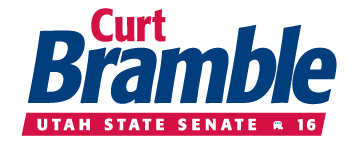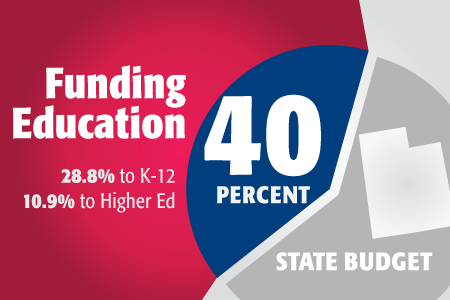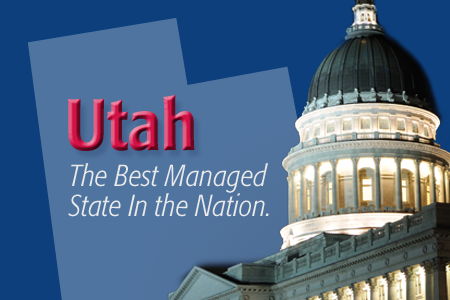Dear Friends and Neighbors,
We have completed week three. This week like the last two, we spent a lot of time in committees.
Committees are where bills go through their first vetting. Each legislator is a member of at least two standing committees and one appropriations committee. President Waddoups assigns a chair to each standing committee and a co-chair to each of the appropriations committee. (The appropriations committees are co-chaired by a House member and a Senate member.) The committee chairs, run the meetings, set the agenda and oversee the hearing process that the bills receive.
[quote align=”right” color=”#0D3F7C”]Our state Constitution requires that we run on a balanced budget.[/quote]
A standing committee hears debate on bills that relate to their assigned emphasis and topics. In the meeting, the bill sponsor presents the bill and what it will accomplish, then members of the committee ask clarifying questions. If you have a concern with or are in favor of a bill, this is a great place for you to participate. Members of the public are invited to comment and testify in behalf of or in opposition to a bill. Committee members ask clarifying questions of public witnesses as well. After the bill as had its hearing, committee members vote on its merit. If it passes, then it is sent to the floor for further debate. If it fails it does not go to the floor. However, if a bill fails, it can still be brought back to the committee at a later date.
The appropriations committee set the budget priorities for their areas. Our state Constitution requires that we run on a balanced budget. So each appropriation committee begins with a base budget, hears from the different entities as to their financial needs and then votes on how they will distribute the available funds.
I serve on the Tax and Revenue and Business and Labor standing committees and the Business, Economic Development, and Labor appropriations committee.
Here is a link where you can find the different committees and the bills they are discussing.
We did do quite a bit of work on bills that have reached the floor this week. Here are some bills that might be interesting to watch.
SB 156 (Senator Valentine) this bill makes the post-retirement benefits for all state elected officials the same as other state employees.
SB 17 (Senator Jenkins) makes the process of getting ballot initiatives on municipal ballots less cumbersome and SB 46 (also Senator Jenkins) provides a way to preserve Utah farmlands.
Senator Stevenson is sponsoring SB 49 that will help keep Hill Air Force Base productive and protected from federal cuts.
SB 31 (Senator Morgan) deals with classroom sizes.
SB 128 (Senator Romero) address teenagers using cell phones while driving.
SB 112 (Senator Niederhauser) looks at changing the taxing structure of cable television.
SB 161 (Senator Bramble) makes Oncology drugs available to patients through their specialized doctor to save them a trip to the pharmacy while they are going through the horrible side effects of cancer.
You can find information on these bills and any other bill that interests you by going to the legislative website.
type the number of the bill (for example SB 111 or HB 111) in the search box on the right side of the page and you will be directed to the information page for the bill. You can also search for bills by typing in a subject or the name of a legislator.
Each week on the senate floor, we honor Utahns who have done remarkable things. This week we honored Utah’s Teacher of the Year, Leigh Vanden Akker and eight rodeo champions, including the 2011 Bareback Riding World Champion, Kaycee Fields. You can see pictures of these and other events that have happened at the capitol this week on our Facebook page.
[quote align=”left” color=”#0D3F7C”]I am grateful that the economy seems to be moving in the right direction. However, one of the realities that we need to deal with this year (and in years to come) as the State’s budget is crafted is the uncertainty of federal funds.[/quote]
I am grateful that the economy seems to be moving in the right direction. However, one of the realities that we need to deal with this year (and in years to come) as the State’s budget is crafted is the uncertainty of federal funds. Utah’s total budget is about $12 billion dollars. But the biggest single source of our funds –just over $5 billion—comes from the federal government. Federal money is just our own money, returned back to us from the federal taxes we pay and over the past decade, Utah has received an average of $1.29 for every $1 of federal tax we pay into federal coffers, but in about half that time, our dependence on that money has risen nearly 5%. It is our dependency that is my concern.
On the federal level, things do not look good. Some have dubbed those who are currently elected as the “do-nothing” Congress. They have failed to address problems ranging from education and transportation to immigration and pensions. Despite all the talk, the debt ceiling continues to rise.
In the last two years, public dependence on federal “assistance” has gone up 23%. “Dependance programs” (housing subsidies, Medicaid, food stamps etc.) account for more than 70% of the federal budget and at the same time that rate is increasing, nearly half of all Americans (49.5%) don’t pay any income tax. (Source: Heritage Foundation) The nation will not be able to sustain this inequitable rate—not even by increasing the rate of taxes on high-income households.
One thing the 112th “do-nothing” Congress did do is give us a glimpse of what can be expected in the future. The Budget Control Act, passed last August will reduce state discretionary program funds over the next nine years. (But the states have no idea where the funds will be cut.) Congress’ inability to reach a consensus on a comprehensive federal deficit reduction plan means that some mandatory state-federal grant programs could lose as much as 9% of their funding in FY 1213 and defense spending cuts could go as high as 10%. At the same time, federally mandated Medicaid will take up a larger and larger share state budgets.
[quote align=”right” color=”#0D3F7C”]We are cognizant that we need to pay down existing debt and increase our savings as much as we can. We are trying to run the state budget the same way you run your home budget.[/quote]
We are doing what we can to prepare for these reductions. Last year, HB 138 required all state agencies assess their reliability on federal funds and create contingency plans of how they would operate on 5% and 25% fewer federal dollars. (There were four senators absent for the final vote of this bill, but other than those four, it passed unanimously off the floor.) We are being cautiously judicious as we listen to the various needs presented in the appropriations committees. And we are cognizant that we need to pay down existing debt and increase our savings as much as we can. We are trying to run the state budget the same way you run your home budget.
On a more up-beat note, according to a report released this week by the Goss Institute for Economic Research, the overall business condition in Utah is at a “vigorous” level. Indicators from production, sales, inventory levels and new orders in manufacturing have ranked us at the top of the Rocky Mountain Region. (Source: Goss Report)
Utah is a great place. We work hard and expect success. We need to continue on the prudent course we have set, doing all that we can to promote growth and stability across all spectrums in the state. I am grateful to represent you in that process.
As always I welcome your opinion and input on our activities during the session.
You can contact me at (801)361-5802 or by email.
Also, please join me at our town hall meeting, Eggs and Issues, on Saturdays at 7:30am at the Urgent Care Building at the Utah Valley Regional Medical Center. (The old granite furniture building on the corner of Bulldog Blvd. and 500 West in Provo).













